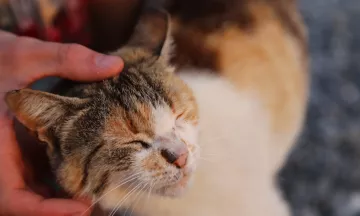A while ago we asked via Facebook whether your cat is an indoor or an outdoor cat and your reasons why. Your replies varied widely, which is hardly surprising, because there are just many arguments both for keeping your cat inside and for allowing him or her outside. So what should your cat be: an indoor or an outdoor cat?
The outdoor cat
An outdoor moggy can give free reign to his natural instincts. A large outdoor playground provides plenty of opportunity for climbing, exploring, and sharpening claws. Cats that are allowed outside can indulge in typical feline behaviour they get plenty of exercise and are generally content. Some cats, however, are so adventurous that they rarely come home, which can be a stressful experience! There are also risks. Once outside, cats are exposed to a number of dangers, including traffic, accidental poisoning, fights (which can also result in the spread of feline aids) and unwanted parenthood, and they can even go missing. Older cats or cats with allergies or injuries are at particular risk. Cats in New Zealand can also be very harmful to natural habitats, killing small native birds and animals, which is why the SPCA discourages allowing your cat to roam (especially in the evenings).

Keeping your outdoor cat safe
Fortunately, you can reduce the risks associated with the 'dangerous outdoors' by microchipping your cat, worming him or her regularly and making sure that all vaccinations are up to date. ALWAYS have your cat neutered too. This way male cats won't wander off in search of a love interest, and female cats won't have an unplanned litter (there are enough unwanted cats and kittens in shelters as it is!). If you allow your cat outside, keep them inside at night and provide him or her with a high visibility, fluorescent collar that bears his or her name and your phone number. And the ideal compromise for you and your cat - why not make a cat run or enclosed playing area? Simply fence off and cover a section of your garden using cat mesh, and your furry friend will be able to enjoy the great outdoors safely, without harming native birds and critters!.
The indoor cat: cosy and companionable
Indoor cats might not get to experience the joys of outdoor living, but they can still lead extremely fulfilling lives. They have a much longer life expectancy, are less likely to suffer from parasites or contagious diseases, and will thankfully never know the dangers of traffic. Another benefit is that they can't do their 'business' in other people's gardens (which keeps the neighbours happy) and they won't come home with any little animals as gifts for you. Indoor cats are often more companionable too: they love snuggling on your lap and you get to enjoy much more of each other's company. Yet there are also risks associated with keeping your cat indoors. They cannot satisfy their hunting instincts for example, and they have fewer opportunities to exercise. This means that they may become bored and take it out on your furniture. There's little 'neutral territory' in the house either, which can create tension and lead to fights with other pets or even children and visitors. Indoor cats that are bored sometimes develop psychological or behavioural problems and are much more likely to become overweight. You also have to watch out for open windows, poisonous plants and dangerous cables, and make sure that medications are kept out of reach. So, as you can see, there are plenty of 'dangers' associated with indoor living too. Happily you can do something about them too!

Keeping your indoor cat healthy
Indoor cats don't have access to a limitless outdoor playground. So provide them with plenty of distractions and opportunity for play. At a minimum, make sure your indoor cat has a good scratching post, plenty of toys and lots of other fun play equipment, such as cat tunnels and squeaky toys. Cat toys needn't be expensive either! Use old cardboard boxes and hang climbing shelves on your walls to create a fun indoor playground for your furry friend. Indulge your cat's hunting instincts by encouraging him or her to chase after a feathered wands or a laser pointer. If you want to give your cat some company, then consider getting a brother or sister as a playmate: that way they can run around together and spend time grooming each other. Don't forget to seal open windows with gauze to prevent your cat from escaping or falling out, and store dangerous electronics and medicines safely out of reach. Also remove any poisonous houseplants and replace them with lovely fresh cat grass instead. Last but not least: Provide a large litter box (or several - at least one for each cat), and make sure you clean and refresh it regularly. Moggies are extremely particular about their toilets!
Should you opt for an indoor or an outdoor cat?
Cats that are already accustomed to going outside aren't great at adapting to being completely indoors later in life. Cats that have been kept inside from an early age can continue to live indoors, provided they're given sufficient stimulation and exercise. So consider the needs of your cat carefully and make sure that it suits your current situation. If your house is a safe environment, you don't mind a little wear and tear on your furniture and you can provide your cat with plenty of entertainment, then indoors might be the way to go. Conversely: if you limit the risks (preferably by enclosing a space in your garden or balcony), your cat can also enjoy a fun and adventure-packed life in the great outdoors.
Is your cat an indoor or an outdoor cat? Why exactly? Share your thoughts by leaving your comment below!






